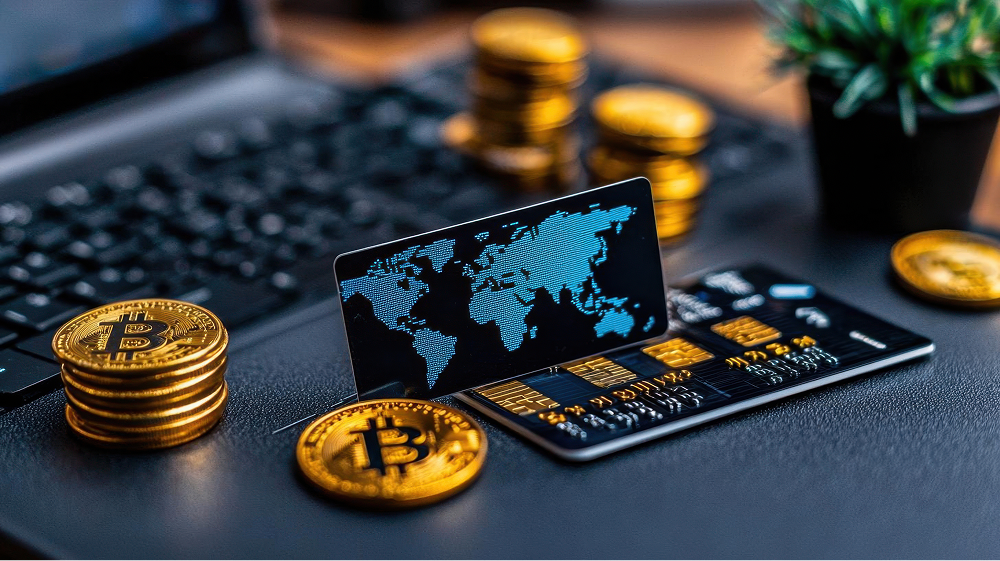Bitcoin payments are everywhere now. More than 15,000 businesses take crypto worldwide. Big companies finally get it.
Microsoft? They take Bitcoin. Xbox purchases, Office subscriptions – all good. Gucci stores accept it too. Fancy handbags with crypto? Yeah, that’s a thing.
Steak ‘n Shake just went full Bitcoin. Every single location across America. First major fast food chain to do it. Emirates airline is next – rolling out crypto payments in 2026.
This isn’t some weird internet money anymore. Real businesses use it. Regular customers pay with it. Airlines, restaurants, electronics stores – they all want your Bitcoin.
So where exactly can you spend crypto? Electronics shopping, flight bookings, restaurant meals, luxury goods. The list keeps growing every month. Way easier to use Bitcoin than most people think. Here’s who actually accepts it.
What is Bitcoin?
Bitcoin is digital money that works without banks or governments controlling it. Created in 2009 by someone called Satoshi Nakamoto. Nobody knows who that really is.
Think of it like cash, but online. You can send Bitcoin directly to anyone, anywhere in the world. No need for banks or credit card companies in the middle. Every transaction gets recorded on something called the blockchain – basically a public ledger that everyone can see.
People store Bitcoin in digital wallets on their phones or computers. Each wallet has a unique address, kind of like an email address but for money. Send Bitcoin by scanning QR codes or copying wallet addresses.
Why do businesses accept it? Lower fees than credit cards. No chargebacks. Payments settle faster, especially internationally. Plus it attracts tech-savvy customers who actually have Bitcoin to spend.
The main catch? Bitcoin’s price jumps around a lot. Worth $30,000 one day, $45,000 the next. That’s why some businesses convert it to regular money immediately.

How do you use Bitcoin?
Using Bitcoin isn’t rocket science, but there are some steps to follow. Here’s how real people actually do it.
How to buy Bitcoin?
First, you need a place to buy Bitcoin. Coinbase is probably the easiest for beginners. Sign up, verify your identity, link your bank account or debit card. It takes about 10 minutes.
Other popular options include Kraken, Binance, and Cash App. Each has different fees and features. Coinbase charges around 1.5% for simple purchases. Cash App makes it super easy but has higher spreads.
Buy however much you want. Start small – maybe $50 or $100. Bitcoin gets expensive, but you don’t need to buy a whole coin. You can buy $20 worth if that’s all you want.
Money usually shows up in your account within minutes when using debit cards. Bank transfers take a few days but cost less in fees.
How to spend Bitcoin?
Two main ways to spend Bitcoin: directly at stores or through gift cards.
Direct spending works like this. The store shows you a QR code or Bitcoin address. Open your wallet app, scan the code, enter the amount, hit send. Payment goes through in seconds for Lightning Network payments, or up to an hour for regular Bitcoin transactions.
Popular wallet apps include Coinbase Wallet, Cash App, or BlueWallet. Each works slightly differently but the basic process is the same.
Gift cards are easier for beginners. BitPay sells gift cards for Amazon, Target, Starbucks, and hundreds of other stores. Buy the gift card with Bitcoin, get a code, use it like any other gift card. Takes the guesswork out of Bitcoin payments.
Some stores like Newegg integrate Bitcoin directly into checkout. Just pick “Bitcoin” as your payment method, scan the code, done. No special apps or complicated setups.
Real-world tips
Start with small purchases. Bitcoin transaction fees can be $5-50 depending on network congestion. Doesn’t make sense for a $10 coffee.
Check the exchange rate before buying. Bitcoin prices change constantly. That $100 of Bitcoin might be worth $95 or $105 by the time you spend it.
Keep receipts. Every Bitcoin transaction is a taxable event in most countries. Need records for tax time.
Most importantly – only spend Bitcoin you can afford to lose. It’s still experimental money, even if major companies accept it now. Don’t put your rent money into Bitcoin expecting to spend it later.
Lightning Network makes smaller purchases practical with instant payments and tiny fees. More stores support it every month.
What businesses accept bitcoin?
Thousands of companies now take Bitcoin payments. Here’s who actually accepts your crypto and how they do it.
Major Companies Accepting Bitcoin
Microsoft leads the pack. They take Bitcoin for Xbox content, Windows Store apps, and Office subscriptions. Been doing it since 2014, stopped for a while, then came back. Shows how mainstream this has gotten.
Tesla made headlines accepting Bitcoin for cars, then stopped, then started again for merchandise. Classic Elon move. You can still buy Tesla gear with crypto though.
Starbucks doesn’t directly take Bitcoin but works with Bakkt for app payments. Whole Foods and Home Depot use the Flexa network for crypto payments. Scan a QR code at checkout, pay with Bitcoin through the SPEDN app.
PayPal and Square let you buy and sell Bitcoin. PayPal even lets you spend crypto at millions of merchants through their checkout system. Your Bitcoin gets converted to dollars instantly.
Tech Companies
Newegg was one of the first big retailers to accept Bitcoin back in 2014. Still going strong. Buy graphics cards, computers, whatever tech you need with crypto. They use BitPay for processing.
Shopify powers over a million online stores. Many accept Bitcoin through Coinbase Commerce or BitPay plugins. Means tons of smaller tech companies and startups take crypto payments.
Wikipedia accepts Bitcoin donations. So does Mozilla, the Firefox people. Open source projects love crypto because it’s borderless and doesn’t need traditional banking.
Namecheap sells domain names for Bitcoin. Makes sense – crypto people love privacy and decentralization. Perfect fit for web hosting and domains.
Retail Companies
Overstock.com was a Bitcoin pioneer. CEO Patrick Byrne went all-in on crypto years ago. They accept Bitcoin, Ethereum, Litecoin, and other cryptocurrencies.
Nordstrom, GameStop, and Barnes & Noble don’t directly accept Bitcoin but sell gift cards through BitPay. Same end result – you can shop there with crypto.
Gucci accepts Bitcoin at select stores in major cities. Louis Vuitton is testing it too. Luxury brands see crypto holders as big spenders with disposable income.
Many Subway locations accept Bitcoin, especially in Europe. Depends on individual franchise owners though. Some Pizza Hut locations take it too.
Entertainment Companies
Twitch streamers get Bitcoin donations through various platforms. Not official Twitch policy but tons of content creators accept crypto tips.
AMC movie theaters accept Bitcoin and other cryptocurrencies for tickets and concessions. CEO Adam Aron pushed hard for crypto payments during the meme stock craze.
The Dallas Mavericks basketball team accepts Bitcoin for tickets and merchandise. Owner Mark Cuban is a big crypto supporter.
Several music festivals and concerts accept Bitcoin. Makes sense for younger, tech-savvy audiences who actually have crypto to spend.
Travel Companies
Expedia used to accept Bitcoin but stopped. Now you need to use gift cards or third-party services like Travala.
Alternative Airlines lets you book flights with Bitcoin for hundreds of airlines. They handle the crypto conversion behind the scenes.
CheapAir.com accepts Bitcoin for flights and hotels. Been doing it since 2013. One of the longest-running crypto travel sites.
Some hotels accept Bitcoin directly, especially boutique places trying to attract crypto tourists. Larger chains like Marriott don’t take crypto directly but accept gift cards bought with Bitcoin.
Emirates announced they’re adding crypto payments in 2026. Could be huge for international travel.
How they actually work
Most companies don’t hold Bitcoin directly. They use payment processors like BitPay, Coinbase Commerce, or BTCPay Server. You send Bitcoin, they receive dollars. Eliminates volatility risk for businesses.
Some companies do keep Bitcoin though. MicroStrategy, Tesla, and others hold crypto on their balance sheets. They see it as an investment, not just a payment method.
The trend is clear – more companies accept Bitcoin every month. Sometimes they pause during market crashes, but overall adoption keeps growing. Even traditional businesses realize crypto customers spend money.
In which countries is Bitcoin accepted as payment?
Bitcoin acceptance varies wildly by country. Some embrace it, others ban it completely.
Legal tender countries
El Salvador made Bitcoin legal tender in 2021. Every business must accept it by law. Results are mixed – the government pushes it hard but many locals stick with US dollars. The Central African Republic also declared Bitcoin legal tender but reversed course due to economic pressure.
Crypto-friendly nations
The United States leads Bitcoin business adoption. Microsoft, Starbucks, Newegg, and thousands of others accept crypto payments. No federal restrictions on spending Bitcoin, though businesses must follow tax rules.
Germany treats Bitcoin like private money. Legal to use for payments. Many local businesses accept crypto, especially in Berlin and other tech cities.
Switzerland calls itself “Crypto Valley.” Zug accepts Bitcoin for government services. Lots of crypto companies are based there because of friendly regulations.
Japan has recognized Bitcoin as a legal payment method since 2017. Major retailers like Bic Camera accept crypto. Very regulated but totally legal.
Restricted or banned countries
China banned Bitcoin payments completely. No businesses can legally accept crypto. They’re pushing their own digital yuan instead.
India flip-flops constantly. Currently allows Bitcoin ownership but banks can’t deal with crypto companies. Makes spending Bitcoin really difficult.
Russia restricts Bitcoin payments for goods and services. You can own crypto but can’t use it to buy stuff legally.
Gray areas
The European Union has mixed rules. Each country decides its own Bitcoin payment policies. The Netherlands and Portugal are crypto-friendly. France requires registration for large transactions.
Canada allows Bitcoin payments but businesses must convert to Canadian dollars for tax purposes. Similar to the US approach.
Most African countries don’t have specific Bitcoin payment laws. Nigeria has huge crypto adoption despite government restrictions. Kenya and South Africa are relatively friendly.
The pattern is clear – wealthy, tech-forward countries generally allow Bitcoin payments while authoritarian governments try to ban them. Enforcement varies a lot though.

Which countries banned Bitcoin?
Some countries really hate Bitcoin. They’ve banned it completely or made it super hard to use.
Total bans
China went nuclear on crypto. Banned everything – mining, trading, payments. All of it. Happened in 2021 when they decided Bitcoin threatened their control. Get caught using crypto? You’re in trouble. They want everyone to use their digital yuan instead.
People still use Bitcoin there though. VPNs help. Underground trading happens. Just risky as hell.
Algeria throws you in prison for crypto. Up to five years behind bars. Their government sees Bitcoin as dangerous to their money system.
Bangladesh says no to all cryptocurrency. The Central bank made it illegal under banking rules. Fines and jail time if they catch you.
Nepal banned Bitcoin too. Police actually arrest people for trading crypto. Their central bank considers it illegal under existing laws.
Partial bans
Russia plays games with crypto rules. You can own Bitcoin but can’t buy stuff with it. Weird middle ground. They’re making their own digital ruble anyway.
India changes its mind constantly. Right now you can own Bitcoin but banks won’t touch crypto companies. Makes spending it nearly impossible even though it’s technically legal.
Turkey said no crypto payments in 2021. Own it all you want, just can’t spend it anywhere. Their central bank got spooked about financial stability.
Religious issues
Some Islamic countries hate Bitcoin for religious reasons. Saudi Arabia discourages it. Egypt’s religious leaders called it forbidden under Islamic law. The government hasn’t officially banned it though.
Reality check
Even banned countries can’t stop Bitcoin completely. People use VPNs, trade peer-to-peer, and find workarounds. China tries hardest to enforce their ban but crypto still exists there.
Most countries that banned Bitcoin want to control their money supply. Some might change their minds as crypto goes mainstream everywhere else.
Why are more businesses accepting Bitcoin?
Money talks. Businesses see real advantages to taking crypto payments.
Lower fees
Credit card companies charge 2-4% per transaction. Bitcoin fees are usually way less, especially with Lightning Network. For big purchases, that adds up fast. A $10,000 sale saves hundreds in processing fees.
Small businesses get hit hardest by credit card fees. Bitcoin lets them keep more money instead of giving it to Visa and Mastercard.
No chargebacks
Bitcoin payments are final. Customers can’t call their bank three months later demanding money back. Chargebacks cost businesses billions every year in lost merchandise and fees.
This is huge for online sellers. No more worrying about fraudulent refunds or payment disputes. Money sent is money kept.
International customers
Bitcoin works everywhere. No currency conversion fees or international payment hassles. Someone in Japan can buy from a US store instantly without banks getting involved.
Traditional international payments take days and cost serious money. Bitcoin settles in minutes for way less.
Younger customers
Millennials and Gen Z love crypto. Businesses accepting Bitcoin attract tech-savvy customers who actually have money to spend. It’s a marketing advantage.
Crypto holders tend to be early adopters who buy new products first. Good customers to have.
Future-proofing
Smart businesses see where things are heading. Better to accept Bitcoin now than play catch-up later. Tesla, Microsoft, and PayPal didn’t wait – they got in early.
Tax benefits
Some countries offer tax breaks for crypto payments. Businesses can write off Bitcoin losses or hold crypto as investment assets.
Less regulation
Bitcoin doesn’t need banks or payment processors. Fewer middlemen means fewer rules to follow. Especially helpful for businesses in restricted industries.
The trend is clear – accepting Bitcoin gives businesses real competitive advantages. More customers, lower costs, fewer headaches.

The Future of Bitcoin as a Payment Method
Bitcoin payments are becoming normal business practice faster than most people expected. The big breakthrough came with Lightning Network technology making transactions instant and cheap. Steak ‘n Shake proved this works at scale – they’re processing thousands of Lightning payments daily across 393 locations without major problems.
Government support changes everything. Trump’s Strategic Bitcoin Reserve signals official backing that makes businesses feel safer about accepting crypto. When governments hold Bitcoin reserves, it stops being experimental internet money and becomes legitimate financial infrastructure. More countries will establish their own reserves because nobody wants to fall behind.
Wallet technology keeps getting simpler. Using Bitcoin used to require technical knowledge that scared away regular customers. Now apps like Cash App and Strike make sending Bitcoin as easy as texting someone. When your grandmother can use Bitcoin without help, mass adoption becomes possible.
Corporate adoption creates momentum that’s hard to stop. Microsoft and Starbucks accepting Bitcoin made it respectable for other big companies to try. Emirates announcing crypto payments for 2026 shows even traditional industries see the future. Every major company that accepts Bitcoin successfully encourages others to follow.
Regulatory frameworks like the GENIUS Act and Europe’s MiCA rules give businesses clear guidelines about what’s allowed. Companies can accept crypto without worrying about sudden law changes that might make them criminals.
The main problem remains volatility. Bitcoin’s price swings make accounting complicated, so most businesses convert crypto to dollars immediately rather than holding it. But payment infrastructure keeps improving while transaction costs keep dropping.
Give it five years and Bitcoin payments might feel as normal as credit cards. The technical foundation already works. Mass adoption just needs time to spread through the business world.
FAQ
Bitcoin itself doesn’t do refunds like credit cards. Once you send it, it’s gone. But stores can choose to send Bitcoin back to you if they want. Most places handle refunds through store credit or by sending equivalent Bitcoin to your wallet. Check their refund rules before buying anything with crypto.
Yeah, unfortunately. Every time you spend Bitcoin, the tax people consider it a sale. If your Bitcoin went up in value since you bought it, you owe capital gains tax. If it went down, you can write off the loss. Either way, keep records of everything. Tax season gets messy fast with crypto.
It’s gone forever. No customer service to call, no bank to fix mistakes. Bitcoin addresses work like account numbers but there’s nobody running them. Always double-check addresses before hitting send. Scan QR codes instead of typing when possible. One wrong number and your money disappears into the void.
Sort of. They see your Bitcoin address but not your name unless you tell them. The problem is, blockchain analysis companies can sometimes figure out who owns which addresses. If you want real privacy, use different addresses for each purchase and don’t connect your real identity to your Bitcoin wallet.
The network gets busy and transactions pile up. People paying higher fees get processed first. During crazy market days, cheap transactions can wait hours for confirmation. Lightning Network fixes this by processing payments instantly off the main blockchain. Way better for buying coffee or fast food.
Most prefer stablecoins like USDC because the price doesn’t jump around. Bitcoin’s volatility makes their accounting a nightmare. Many use payment processors that convert everything to dollars automatically, so they never actually hold crypto. Ethereum works well for online stuff. Dogecoin is popular for tips and small purchases.
Tough luck. You paid what you agreed to pay at that moment. Price changes afterward don’t matter for completed purchases. Works the other way too – if Bitcoin moons after you spend it, you don’t get extra money back. The deal was done when you hit send.
Conclusion
Bitcoin payments aren’t some future thing anymore. They’re happening right now. You can buy a burger at Steak ‘n Shake with Bitcoin. Book flights with crypto. Shop at Microsoft and Starbucks.
Sure, Bitcoin’s price bounces around like a ping pong ball. And yeah, doing taxes with crypto is annoying. But regular businesses figured this out. If a fast food chain can make it work, anyone can. The weird experimental phase is over. Bitcoin payment infrastructure actually functions now. Companies that were scared to try it three years ago are jumping in. More options appear every week. Electronics stores, airlines, restaurants, luxury brands. The list keeps expanding. What felt impossible in 2020 is totally normal business now. Thinking about accepting Bitcoin at your business? We get it – seems complicated and risky. Truth is, it’s way easier than most people think. We help businesses start taking crypto payments without screwing anything up. Show you which payment systems work, handle the boring legal stuff, make sure you don’t lose money on fees. Your customers want to spend their Bitcoin somewhere. Might as well be with you. Drop us a line and we’ll explain how this actually works.




